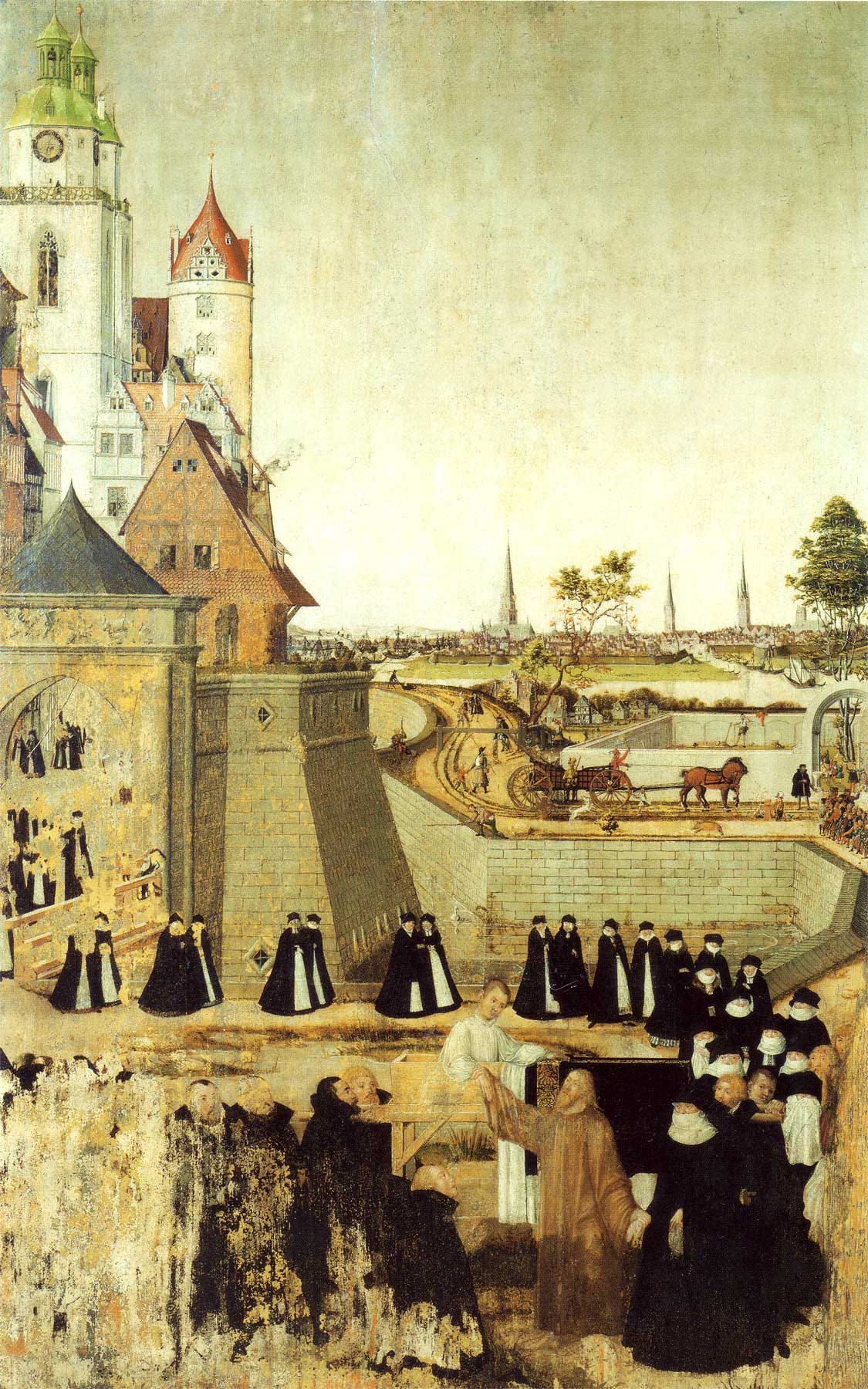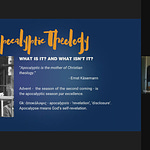What are we to make of a story like this? How should we respond to a story like this when every time we switch on the news there is so much division, so much destruction, so much death? Another insurrection? Another Prime Minister? Another stabbing? Another epidemic? Another shooting? Another famine? Another acid-attack? Another drought? What are we to make of this when just yesterday, Putin’s war against Ukraine raged past its grim two-year milestone, a war in which thousands of sons have been lost? Thousands more widows grieve… What is one son after two millennia of doom and death? What are we to make of a story like this in light of a world like ours?
Surely the most rational response to the horrors we witness is despair. If we can’t face despair then we might as well slide into denial – maybe that’s why some of us are here? The church is a sanctuary away from the horrors of the world, a place to forget, a place to “wait it out” until Jesus returns as judge. Or perhaps if despair and denial don’t work for you then maybe nihilism – the philosophical belief that everything is meaningless – is the sanest and most honest response… right? Yes that’s right, it’s right that is, only if God is not up to something in the world… I venture that most of us are here today because we believe that God is indeed up to something in the world.
Welcome to the minority! CofE churches are emptying at record speeds, in the last 5 years alone there has been a drop in attendance of 200,000 people. So, seeing as you are here, I’d best do my job and not waste your time in handing over the goods and announcing to you the fear-inducing Gospel of God’s Grace again this morning. Just as the crowds declare, “God has visited his people!”, the risen, ascended and fully alive Jesus Christ declares to those dead in Sin “I say to you, Rise!”
We find our Lord Jesus, ever on the move, outside a town called Nain. The third town so far in Jesus active ministry to be named in Luke’s Gospel, and like the first, Nazareth, Nain is an obscure little town of minimal significance. So, we can just as well ask the question, “can anything good come from Nain?”, “Can anything good come from Nain?” Most of our modern translations of this passage, miss out a word that is in the original Greek text of Luke’s Gospel. It usually goes like this, “Soon afterward he went to a town called Nain, and his disciples and a large crowd went with him.” The original Greek would go more like this, “Soon afterward he went to a town called Nain, and his disciples and a large crowd went with him, and look!” “Look” Luke urges us, as though we were one of the crowd. “Look!” Luke invites us into the story. “Look! Behold! Pay attention! God is about to do something.”
At first it would appear that the answer to the question, “can anything good come from Nain” is simply “No.” For as we look unto Nain, we are met with the saddest and most desperate sight of all, a parent burying their child. Luke has drawn us into the crowd that Jesus has with him. We’re tagging along because this guy Jesus is exciting, he’s a good preacher, he’s a healer, and rumour has it he’s a prophet, rumour has it, there is something of the divine about him. Even his disciples do not fully realise just yet that Jesus not only has something of the divine about him, He is the divine! And perhaps looking unto Nain and the slow procession of mourners bewailing the death of the widow’s only son, we hear murmurs in the crowd, “Well this is a bit of a killjoy.” These days we prefer not to look upon death if we can help it, back then in ancient Galilee, it was a normal part of life. “Come on Nazarene, there’s nothing to see here, let’s keep moving. This boy is dead, there is nothing you can do.” Perhaps the disciples are urging Jesus into the town, “We’ve been walking for some time, come Yeshua, let’s get something to eat and drink and you can teach us…” but Jesus has stopped. Jesus is looking.
This widow has lost not only her husband, but also her only Son. In a patriarchal society like the ancient near east, this would have meant that she was now bereft not only of her child – the sign of God’s covenant blessing – but also her last remaining male protector. She would have been destitute. In the Bible, widow is shorthand for the bottom of the pile, without hope or future.
But, as the author of creation, the one true Israelite, and the voice of the Hebrew Scriptures Jesus stops and looks upon the widow. Perhaps he had the Hebrew top 150 running through his mind with lyrics like, “The Lord upholds the widow and the fatherless…” (146:9), or as the Psalmist sings elsewhere “Father of the fatherless and protector of widows is God in his holy habitation” (68:5). Or perhaps Jesus is also recalling the words of the Prophets “Show kindness and mercy to one another, and do no oppress the widow” (Zech. 7:9), “Plead the widow’s case” (Isa. 1:17), or maybe still the law He once gave to His servant Moses, the he Himself fulfils, which orders Israel to “…not mistreat any widow or fatherless child.” (Exo. 22:22). Jesus looks upon the widow.
Luke’s Jesus is no way near as emotional as the Jesus of Matthew and Mark, so when Luke mentions an emotion, you know you need to pay attention. The salty tears of compassion are gathering in his corneas as Jesus looks upon the grieving widow of Nain. Just as when the Spirit hurled him out into the wilderness after his baptism to be tempted by the devil, Jesus is moved once again, “moved with compassion” the text tells us. He breaks away from his own crowd and steps toward the widow’s crowd. And note well, no one has asked him to do this! He just does it, it is sheer grace in action. To reiterate the point I made a few weeks ago, Jesus does not require your faith, or your repentance, or your love to move towards you and redeem you.
I think it unlikely at this point, but maybe one or two among his followers, perhaps one of the disciples began to notice something here, something familiar. Jesus is walking like a prophet. Maybe some of the crowd had dared to journey with him since his apparent failed attempt at preaching in his hometown. Perhaps they had heard his sermon in the Nazareth synagogue, after claiming Isaiah’s manifesto for his own; “The Spirit of the Lord is upon me, because he has anointed me to bring good news to the poor. He has sent me to proclaim release to the captives and recovery of sight to the blind, to set free those who are oppressed, to proclaim the year of the Lord’s favour”, Jesus couldn’t then keep his mouth shut and he continued his sermon, “there were many widows in Israel in the time of Elijah … yet Elijah was sent to none of them except to a widow at Zarephath…”
Back then when Israel was ruled not by a foreign empire but by its own corrupt monarchy, God sent “the great troubler of Israel”, the prophet Elijah, to the gentile wastelands of Zarephath. At the gate of that city Elijah looked and saw there a pagan widow and her young pagan son. God told Elijah to stay with them. The widow’s son eventually became so ill that the text in 1 Kings tells us that “there was no Spirit left in him.” And just as the widow’s son at Nain is carried on his funeral bier, Elijah carried the widow’s son at Zarephath to his resting place, in an upper room of the house. And there, hardly knowing what to do Elijah laid out the boy, and then perhaps in an act of sheer desperation, momentarily disregarding the shame and ritual contamination of corpses, he did something very strange, he threw himself on the body of the boy completely covering him with his own body not once, not twice, but three times. Perhaps, unbeknownst to him, Elijah laid down once, “In the name of the Father,” twice, “In the name of the Son,” and three times, “In the name of the Holy Spirit.” The boy was raised to life once more, and Elijah “gave him to his mother,” who declared “I know that you are a man of God, the Lord’s word in your mouth is true.”
Jesus has left his crowd of followers and has joined the crowd of mourners. But his intent is not to join in the procession, but to put an end to it. I think it’s safe to say that Jesus is a terrible party guest, whether it’s offending his own mother at a wedding, or annoying his pharisaic hosts at their dinner party, or bringing that weird plus one who wears to much perfume and cries a lot, or making a scene at a wake – he seems to know no shame. Jesus, like the so called ‘Tank Man’ – the unnamed rebel who in 1989 in an act of defiance stood in front of the line of tanks in Tiananmen Square in Beijing – brings this funeral procession to a halt. The harbingers of death are stopped dead in their tracks.
The one who weeps at the tomb of his friend Lazarus, who weeps in Gethsemane on that fateful night before his arrest, now shows us a foretaste of John the Revelator’s vision of that longed-for day when God Himself will wipe away every tear. With one outstretched hand he gently lifts the downcast widow’s face and wipes away her grief with the simple words, “Do not weep.” As the Psalmist says, “those who sow in tears will reap in joy.” And with the other hand outstretched Jesus touchers the bier of the widow’s son, and in the very same voice which the entire universe was created from nothing, he calls forth life from the nothingness of death saying to the young man, “Rise!” Before placing the man, now alive and well, into the embrace of his mother.
What are we to make of this story in light of a world like ours? Well, the simple fact of this story, and the witness of the Bible, is that Jesus never meets a corpse who does not rise; whether it be this widow’s son at Nain, or Jairus’s daughter, or Mary and Martha’s brother Lazarus, and yes, even the widow’s son at Zarephath in 1 Kings is the work of Jesus… They all rise from the dead not because Jesus is somehow magic, not because he pulls a number on them, but simply because Jesus has that effect on Death. They rise not just because he did, but because He is resurrection. He is both the subject of resurrection, and the verb. Jesus is resurrection.
The Jesus whose touch has never failed to raise the dead, who gives this once dead Son to his mother, is no different from the Jesus who at the final future of this world, will raise us all and cast us into His Father’s loving embrace.


















Jesus is Resurrection